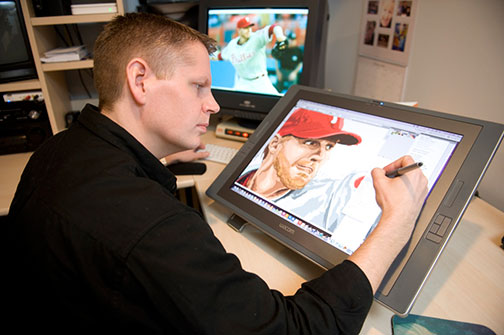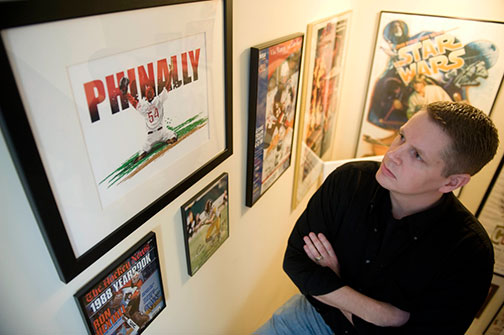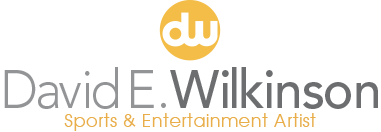The Downside of Digital
A Message to Aspiring Artists
I was contacted recently by someone who inquired as to what software I use to create my work. He sounded rather frustrated as he informed me “no matter what I do on Photoshop, I can’t get close to your painted/Cartoon effect.” Before I answered him I wanted to find out a little bit more about his approach. So I answered his question with a question and asked him what his technique was. Far too often these days people grab a photo from the internet, throw some Photoshop filters on it and call it “art”. Sites like Fine Art America and Ebay are filled with this stuff for sale. Much to my dismay, this is exactly what my friend was doing.
As someone who takes what I do very seriously and puts a lot of pride in my work, I find this rather frustrating. It almost becomes an immediate assumption if it is digital art that it is some gimmick or trick of the computer. Case in point is the message I received. He believes my work is not the result of talent, years of training and hard work but a Photoshop filter. Nothing can be further from the truth in my case. Yes, of course there is definitely a convenience with digital art that you do not get in real life. I have written previously about how I have found the ability to undo my actions liberating and how I have taken chances that I would probably have never had the creative guts to otherwise. I could go on but that is not the point of this particular post.

In my response I went on to explain that each of my images are meticulously painted. Maybe even more so than a traditional painting as each side of each stroke or shape is carefully considered and applied. This to multiple levels of a range of colors and shades… again each carefully created.
While each stroke applied to a physical canvas with a brush coated with paint is unique, I am working on my images usually at 800% or more carefully shaping each brush stroke. The equivalent to working under a magnifying glass. I needed to assure my friend that I do not use any filters of any kind. Not a one. Just talent, a collection of custom made brushes, a high attention to detail and a ton of patience which all comes from a love of what I do.
The message I wanted to share with him and every other aspiring artist who chooses to read this is this. While the computer is a great tool, it is just a tool like a paint brush, air brush or other traditional tool. Sure, it is like all of these rolled into one but in the end as you cannot and should not rely on the paint brush to do the work for you. You should avoid letting the computer do too much of the work for you with filters and the like. When you do, your tool becomes a crutch. While this may achieve an easy effect that looks cool and meets a desire for immediate gratification. You have to ask yourself something, what did you bring to the work? Someone else’s photo? Someone else’s filters?
If you truly see yourself as an artist and want to be an artist then you need to put yourself into your work. You are original and that is what will make your work original. I have said it many times before. Art should always be an expression of self and come from within. That will never happen with a filter or series of filters because the creative thought begins with the filter and what effect it will produce. You will then forever be limited by your collection of filters. When someone can copy the same steps using the same collection of filters, how unique is what you create in the end? How much of “you” is really in there?
Sadly this is the downside of the computer as an art tool and the way of the world really. I see it every day. People buy a computer, throw some filters on an image and say it is “art”. They use the same computer, pick some fancy fonts and say they are a “designer”. I suppose it is up to everyone else to decide for themselves if it is or isn’t “art”. After all, art is truly subjective. One can only hope that in the end the “cream rises to the top” as they say and the truly great artists and designers work ultimately stands above the rest.
As someone who has worked very hard at what I do, it is discouraging for me to see aspiring artists choosing this path because it can make a person lazy. By doing this, they may never find their true potential as an artist. Even if there was a filter that allowed him to easily copy my art. What would have been gained for him? What would he have learned?
I also want to point out that I am not saying that using filters as an accent to your work or an element of your work is bad either. On the contrary, that is what makes the computer such a wonderful tool. But the problem arises when the filter becomes the artist out of lack of vision or effort by the user.
My recommendation to him and every student or aspiring artist is this. Learn to draw and paint traditionally. Sketch with pencils. Paint with all kinds of paints. Get your hands dirty. Make mistakes that you cannot simply “undo” but have to find your way out of. This is how you learn and grow as an artist. It is like the difference between using a GPS and getting yourself lost without one. The GPS may get you there quicker and easier but you will see much more and perhaps learn a new way there if you take a wrong turn, get lost and are forced to find your way out. Everything I do digitally is built on years of working with traditional mediums (and 4 years of art school). So while I am working digitally I can think and understand traditionally. I understand why things are they way they are and apply that knowledge to what I am doing.
In the end my message to my friend was there is no easy way to do what I do. There is no filter that will give you the same result… at least that I know of. Even if there was, you have to ask yourself, how proud will it make you feel to use it? How much pride can one really feel in that instance?
I will leave you with a quote from that now famous Steve Jobs commencement speech that goes to the heart of what I am trying to say when he said “the only way to be truly satisfied is to do what you believe is great work. And the only way to do great work is to love what you do.”
I don’t know that I will ever be able to consider anything I do as “great”. I am after all my worst critic. But no matter what, I do love what I do. I will let others decide it’s greatness.

© 2014 The Wilkinson Gallery.LLC
Photos courtesy of The Courier Post

7 Comments
Gerry Nailon
May 24, 2014Nice blog David! As a non-artist that enjoys your work enough to purchase it, it’s nice to understand or have a sense of what you do it & how you do it. It’s on my wall & people ask… So I appreciate a little education on your art.
I would like to order the Dawkins retirement piece next.
Best Regards,
Gerry
David
May 25, 2014Thank you so much for the comment and kind words Gerry. Much appreciated.
Jay
November 28, 2014Excellent post. I have had similar conversations.
At a recent gallery showing I was discussing my work with someone and they said “oh, you just use Photoshop?” The assumption being that we just apply some filter and we get instant art.
That’s like saying to a painter “oh, you just use a paint brush?”
Keep up the great work and thanks for sharing
Jay
SherryO
August 21, 2015David, this is spot-on for so many of us artists and those who use those powerful programs to enhance our work, not depend on those programs to DO the work for us.
So many people mistakenly assume what you mentioned, that the introduction of the computer is the “be all, end all” and anybody with Photoshop is or can be an artist. It’s a tool only; it doesn’t possess vision or true creativity or, in some instances, good taste. While off on the “get me rich, quick” whim, people truly miss that important detail. I see it in my world everyday too and many times all I can do is shake my head at their misguidance.
I’ve been in my industry for a long while and unfortunately, new artists and designers aren’t being taught the fundamentals or how these powerful programs have made our lives easier; a wet-behind-the-ears print artist would have NO clue what cutting a Rubylith involves, because a Photoshop filter now masks an image for you. There’s no perspective that leads to full appreciation for all that can now be done digitally, versus once upon a time when it could only be accomplished by a steady hand and a loop. To become a master at your art, you need to understand and respect how progress has made the process easier, and while the powerful tools make it seem as though the layperson could do anything, it’s the training and finesse that sets the true artists apart from the hobbyists using Photoshop Elements and Word.
David
August 21, 2015I attended The Hussian School of Art in Philadelphia from 1990 – 1994 which was in the infancy of applications like Adobe Illustrator, Photoshop, Quark XPress and the like. One thing I was always grateful to the Hussain for was that before ever letting us touch a computer they taught us all the traditional methods of cutting Amberlith, doing marker comps, cut and paste, doing layouts by hand, drawing our type, etc. Perhaps it was just to delay us because there were not enough computers to go around but regardless, it really made the terminology and methodology of what we were doing on the commuter make much more sense when we got there. It also gave us a much greater appreciation for it. Even when we started on the computer they only allowed us to use the 12 basic fonts that came with the machine. They did not want us relying on the multitude of fancy type faces that were becoming available as a crutch. Easy to think “gee, look how cool my fonts look” and assume your design is solid.
Thanks for the comment.
Dave
Judy Smithey
October 25, 2015Dear David,
I read your comments about FFA and agree 100% with your observations. Also, I admire digital artists very much. Art is art, it doesn’t matter what the format is. I only wish I could learn the
techniques, but I even have trouble with iPad art.
Judy
David
October 26, 2015I definitely admire many digital artists I see and agree that it is not the format that determines if it is “art”. What determines that in my opinion is what the artist puts into it? How much self expression was put into it? How much creativity? On a very basic level, how much effort? In regards to the computer, how much work did the computer do and how much did the artist? Someone throwing filters on an image in Photoshop is not “art”. if it is then the computer is more of the “artist” than the person simply selecting the filter.
Dave